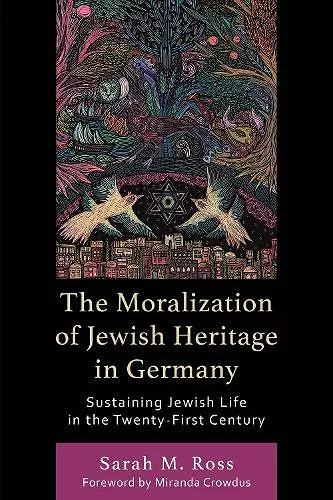The Moralization of Jewish Heritage in Germany
Sustaining Jewish Life in the Twenty-First Century
Format:Hardback
Publisher:Bloomsbury Publishing PLC
Published:16th Sep '24
Currently unavailable, and unfortunately no date known when it will be back

The book critically examines the making of German-Jewish musical heritage and its location and dubious non-location within the German cultural sector and larger Jewish community in Germany. It further theorizes on the intersection of Jewish heritage and cultural sustainability by employing thoughts and ideas of critical heritage studies.
This book explores and reveals the intricacies of Jewish heritage in contemporary Germany, the role it plays as a "moral heritage" in the symbolic representation of Jews and Judaism in the national landscape, and its relevance for the cultural sustainability of local Jewish communities. The practice of synagogue music in the past and present is a central case study in the discussions. This ethnographic study examines how Jewish liturgical music as the cultural heritage of minorities has been constructed, treated, discussed, appropriated, and passed on to different actors in different forms and for different purposes over time. It also examines the resulting moral and ethical questions and power imbalances. The author discusses how both Jewish and non-Jewish stakeholders utilize the music of 19th- and early 20th-century Reform Judaism and the Minhag Ashkenaz for a symbolic reconstruction of German Jewry. Furthermore, they repatriate it in local Jewish communities today. This is usually done for individual, sometimes commercial, rather than religious reasons. The Jewish-musical cultural heritage process is characterized by moral imperatives and complex negotiations about power and representation. It reveals problematic aspects of German-Jewish relations, cross-generational rifts, and denominational differences between the Jewish communities in post-war Germany.
[Ross] offers a powerful and timely contribution to critical heritage and memory studies—with a Jewish twist—though by no means limited to Jews... Ross’s book is brave and necessary. * Contemporary Jewry *
A fascinating study of the many processes by which (Jewish musical) heritage is constructed. Sarah Ross shows how Christian and Christian-inflected values have shaped the memory, promotion, and performance of synagogue music in post-1945 Germany, often at the expense of Jewish perspectives. Highly recommended! -- Anthony Kauders, Keel University
If there was any doubt about the unique contribution that ethnomusicology can offer to contemporary Jewish studies, then the incisive critique of the politics and economics of synagogue music in contemporary Germany by Sarah Ross shows its subversive potential with lucidity. Framing the results of her long-term ethnography among agents active in the production of music in present-day German-Jewish communities and non-Jewish institutions along theoretical postulates of Critical Heritage Studies and the idea of the “moralization” of post-War Jewish existence in Germany, Ross addresses two sensitive issues: first, how discrete social, political, economic and cultural interests of Jewish and non-Jewish agents determine the criteria for the selective preservation of German-Jewish musical heritage, its circulation and performance in Germany today; second, how meaningful, if at all, is the maintenance and reconstruction of this Jewish musical heritage of the past for members of a young generation of German Jews who have no memories of the pre-War (or even the pre-unification) period or (more commonly) no roots in Germany at all. This is a courageous document that will probably trigger frank discussions regarding the future of Jews and Judaism in one of the most conspicuous lands in Jewish history. -- Edwin Seroussi, The Hebrew University of Jerusalem
Sarah M. Ross has written an important and daring book. By way of the example of music she shows the long-term effects of genocide, minority/majority relations, symbolic praxes and coping strategies. Her book is a crucial contribution beyond the Jewish/German bracket. The appropriation of cultural heritage is not limited to colonial contexts, but it needs to be located in the nexus of power relations in situ. Hopefully, this book will reach broad audiences and trigger a much needed, less polemic, and more honest debate about memory culture and politics in Germany. -- Dani Kranz, DAAD Wilhelm and Alexander von Humboldt Chair, El Colegio de México, Mexico City, Mexico
ISBN: 9781666904390
Dimensions: 236mm x 160mm x 25mm
Weight: 558g
256 pages